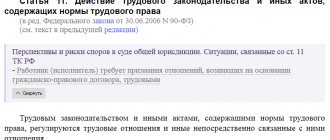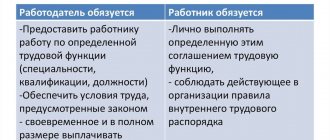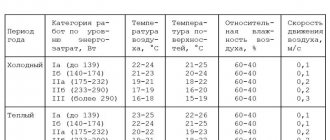We indicate PPE in the contract
It is clear that an employment contract must be concluded with each full-time employee of the organization.
The issuance of PPE is not considered one of its main conditions. However, other conditions not mentioned in Article 57 of the Labor Code of the Russian Federation, but provided for by labor legislation, must be included in the text of the labor agreement between the organization and the employee (paragraph 11, part 2, article 57 of the Labor Code of the Russian Federation). Therefore, personal protective equipment must be mentioned in the employment contract. Now let’s move on to the question of how the issuance of PPE is formalized in an employment contract. A sample inclusion of this item in this document might look like this:
It is clear that there is no single correct formulation regarding the provision of PPE to employees of an enterprise. However, this sample employment contract with an employee, which stipulates the provision of PPE, can be used without doubt. This formulation is universal.
Please note that the absence of a standard for issuing PPE in an employment contract may become the basis for claims from regulatory authorities. Moreover, the courts indicate the legality of holding employers accountable for this violation of labor legislation (see the decision of the Perm Regional Court dated November 30, 2016 No. 7-2052-2016 (21-1272/2016), the resolution of the Ivanovo Regional Court dated November 21, 2016 No. 4a- 342/2016).
Therefore, it is safer for the mention of the PPE standard in the sample employment contract to look like this:
In general, established standards for issuing special personal protective equipment apply. However, the employer can improve the situation of employees by expanding the list and/or quantity of workwear, safety footwear and other personal protective equipment issued to them. Such increased standards must be approved by the relevant internal act of the employer based on the results of a special assessment of working conditions and taking into account the opinion of the trade union.
New standards must be included in a collective and/or labor agreement indicating standard standards, compared with which the provision of personal protective equipment to workers has been improved. So says paragraph 6 of the order of the Ministry of Health and Social Development of Russia dated June 1, 2009 No. 290n “Inter-industry rules for providing workers with special clothing.”
If you find an error, please select a piece of text and press Ctrl+Enter.
Differences between old and new rules regarding PPE
In the latest edition, Order 1122 on the issuance and provision of protective equipment to workers has some fundamental changes compared to the previous version:
- Most funds must be entered into the employee’s personal card when issued. But now it is not necessary to record the dispensing of substances for easily washed off dirt on the card.
- Now, in addition to fixing the norms for the distribution of substances in the employment contract, the employee can be informed using a special act. Information must be provided in writing so that it can be confirmed.
Standard standards for the free distribution of flushing and (or) neutralizing agents to employees (fragment)
| N p/p | Types of rinsing or disinfecting agents | Name of work and production factors | Issue rate per employee per month |
| Cleansers | |||
Soap or liquid detergents, including:
| Work related to easily washed off contaminants | 200 g of toilet soap or 250 ml of liquid soap in dispensing devices | |
| 300 g of toilet soap or 500 ml of liquid soap in dispensing devices | ||
| Solid toilet soap or liquid detergents | Work involving hard-to-remove, persistent contaminants (oils, greases, petroleum products, varnishes, paints, resins, adhesives, bitumen, fuel oil, silicone, soot, graphite, various types of industrial dust, including coal and metal) | 300 g of toilet soap or 500 ml of liquid soap in dispensing devices | |
| Work in coal and shale mines, in open-cast mines, in processing and briquette factories, in mine construction and mine installation organizations in the coal industry | 800 g of toilet soap or 750 ml of liquid soap in dispensing devices | ||
| Cleansing creams, gels and pastes | Work involving hard-to-remove, persistent contaminants (oils, greases, petroleum products, varnishes, paints, resins, adhesives, bitumen, fuel oil, silicone, soot, graphite, various types of industrial dust, including coal and metal) | 200 ml |
Clause 7 of the Model Standards mentions work involving easily washable contaminants. What exactly is considered such work? This is not explained either by the Model Norms themselves or by the Standard.
During inspections, labor inspectors insist that employment contracts with secretaries, lawyers, managers and other office workers must specify the standards for issuing them toilet or liquid soap. Accountants and personnel officers write about this on forums.
The concept of “work associated with easily washed off contaminants” is disclosed in the Order of JSC Russian Railways dated December 17, 2012 N 2587r. Although this document is a local regulatory act of Russian Railways, we will use it to clarify the situation.
So, easily washed off pollutants include, in particular:
- organic solvents;
- various types of industrial dust (wood, siliceous, etc.);
- fiberglass;
- cement, lime;
- disinfectants;
- acids, alkalis, salts, etc.
As you can see, the list of easily washable pollutants is quite specific. It is unlikely that the work duties of a secretary or accountant are associated with such harmful production factors.
For whom entries in employment contracts about soap are required
According to the author, records about the standards for issuing soap are necessary in employment contracts with employees engaged in the following works:
- with harmful and (or) dangerous working conditions;
- in special temperature conditions;
- associated with pollution.
Purchasing soap for toilets used by non-polluting professions (accountants, secretaries, lawyers, etc.) has a different explanation.
The company is obliged to provide sanitary services for employees (paragraph 18, part 2, article 212 and part 1, article 223 of the Labor Code of the Russian Federation).
The Labor Code does not oblige the employer to stipulate in the employment contract with employees all the nuances of their sanitary and household services.
It is possible that inspectors from the labor inspectorate will not agree with this approach. If you want to protect yourself 100%, use the recommendations for issuing flushing or neutralizing agents to employees for whom this is mandatory.
>What documents need to be completed in connection with the mandatory provision of soap to employees?
To purchase, issue, use and write off soap, a number of documents must be completed.
News for HR for August 2015
Such conditions, in particular, include working conditions that meet labor protection and production safety requirements. The concept of working conditions is established by the provisions of Art. 209 Labor Code of the Russian Federation. Thus, working conditions should be understood as a set of factors in the working environment and the labor process that influence the performance and health of the employee.
Also in accordance with the provisions of Art. 22 of the Labor Code of the Russian Federation, the employer is obliged, in particular, to provide for the everyday needs of employees related to the performance of their labor duties. According to Art. 223 of the Labor Code of the Russian Federation, the employer is responsible for providing sanitary, medical and preventive services to employees of organizations in accordance with labor protection requirements. At the same time, according to the position of the Ministry of Labor and Social Development of the Murmansk Region, when providing flushing and (or) neutralizing agents through a dosing system, a personal accounting card for the employee may not be issued, but this does not negate the employer’s obligation to organize proper accounting and control over their issuance (letter from the Ministry of Labor and social development of the Murmansk region dated May 14, 2014 N 09-03/M-440-S). Please note that responsibility for the timely and full issuance of flushing and (or) neutralizing agents to employees in accordance with the Standard Standards, for organizing control the correctness of their use by employees, as well as for the storage of flushing and (or) neutralizing agents is the responsibility of the employer (his representative) (clause 26 of the Standard).
Attention
How should accounting and control over the issuance of flushing and (or) neutralizing agents to employees be organized? Is it necessary to issue funds to each employee against signature on a personal account card? Which employees must be given these funds? Having considered the issue, we came to the following conclusion: The employer is obliged to provide flushing and (or) neutralizing agents to employees engaged in work named in the order of the Ministry of Health and Social Development of Russia dated December 17, 2010 N 1122n. The issuance of flushing and (or) neutralizing agents to employees must be recorded against signature on a personal record card for the issuance of flushing and (or) neutralizing agents. Rationale for the conclusion: In accordance with part one of Art.
Order on approval of standards for the free distribution of flushing and neutralizing agents to employees
—————————————————————————¬ ¦ Joint Stock Company “Cornucopia” ¦ ¦ (JSC “Cornucopia”) ¦ ¦ —————— —————————————————— ¦ ¦ ¦ ¦ ORDER N 29 ¦ ¦ on approval of standards for free distribution to employees of ¦ ¦ flushing and neutralizing agents ¦ ¦ ¦ ¦ g. Orel August 12, 2015¦ ¦ ¦ ¦ In order to improve the protection of workers from pollution existing in the workplace¦ ¦ in accordance with Part 2 of Art. 221 of the Labor Code of the Russian Federation and Order of the Ministry of Health and Social Development of Russia dated December 17, 2010 N 1122н ¦ ¦ ¦ ¦ I ORDER: ¦ ¦ 1. To approve the standards for the free distribution of flushing and neutralizing agents to employees in accordance with Appendix 1 to this order. ¦ ¦ 2. Head of the HR Department V.A. Poshekhonova by August 17, 2015: ¦ 2.1. Familiarize employees with this order with the provision of free distribution of flushing and neutralizing agents. ¦ ¦ 2.2. Prepare draft supplementary agreements to the labor contracts of employees, who are provided with free distribution of cleaning agents and disinfectants. ¦ ¦ 3. Responsibility for issuing detergents should be assigned to the head of the labor protection department, R.I. Vorotilov. ¦ ¦ 4. I reserve control over the execution of the order. ¦ ¦ ¦ ¦Director Pechenkin Z.G. Pechenkin ¦ ¦ ¦ ¦The order has been reviewed by: ¦ ¦ ¦ ¦Head of the HR Department Poshekhonova V.A. Poshekhonova ¦ ¦ August 12, 2015¦ L—————————————————————————— >Soap dispensing registration card
The employer is required to keep records and control over the issuance of flushing and neutralizing agents to employees (sample 3 on p. 97).
Sample 3
How
The purchase of flushing and neutralizing agents is carried out at the expense of the employer.
The list of workplaces and the list of employees for whom the issuance of flushing and neutralizing agents is required is compiled by the employer’s labor protection service based on the above Standard Standards and in accordance with the results of the special assessment system (if a special assessment was carried out).
A provision for the provision of cleaning agents to employees involved in work with contamination should be included in the employment contract.
In addition, it is necessary to record the issue of soap to employees in a personal card for recording the issue of flushing and (or) neutralizing agents.
You can download the Order on approval of the standards for the free issuance of flushing and neutralizing agents to employees and the Personal Accounting Card for the issuance of flushing and (or) neutralizing agents here.
What labor protection documents need to be completed?
Additional agreement to the employment contract (fragment)
—————————————————————————¬ ¦ ADDITIONAL AGREEMENT N 2 ¦ ¦ TO EMPLOYMENT AGREEMENT N 32/14-td dated 04/17/2014 ¦ ¦ ¦ ¦ G. Orel August 18, 2015¦ ¦ ¦ ¦ Joint Stock Company “Cornucopia”, hereinafter referred to as ¦ ¦ “Employer”, represented by director Pechenkin Zinovy Georgievich, ¦ ¦acting on the basis of the Charter, on the one hand, and Novikova Valeria ¦ Alexandrovna , hereinafter referred to as “Employee”, on the other hand, “have entered into this additional agreement to the employment contract” ¦N 32/14-td dated 04/17/2014 on the following. ¦ ¦ Section 5 of the employment contract “Rights and obligations of the employee” shall be supplemented¦ ¦p. 5.4: ¦ ¦ “In order to improve the protection of workers from pollution existing in the workplace” in accordance with Part 2 of Art. 221 of the Labor Code of the Russian Federation and Order of the Ministry of Health and Social Development of Russia dated December 17, 2010 N 1122n. “The employee is given flushing and (or) neutralizing agents once a month - 200 g of toilet soap or 250 ml of liquid soap in dispensing devices.” . ¦ ¦ Changes to the employment contract, determined by this additional agreement, come into force on August 18, 2015. This additional agreement is an integral part of the employment contract, drawn up in two copies having the same legal force. One copy is kept in the Employer’s personal file.
¦Worker, the second - from the Worker. ¦ ¦ <…> ¦ L—————————————————————————
Distribution of soap and detergents in 2018
Based on the title of this note, attentive readers correctly guessed that we are talking about the abolition of the requirement to record the issuance of soap or liquid detergents to employees, including for washing hands and bodies, in a personal card for recording the issuance of rinsing and (or) disinfectants. This is true. According to the amendments, paragraph three of paragraph 24 now reads as follows:
The issuance of flushing and (or) neutralizing agents to employees, with the exception of the products specified in paragraph 7 of the Model Standards, must be recorded against signature in a personal card for recording the issuance of flushing and (or) neutralizing agents, a sample of which is provided in the appendix to the Standard.
As you probably remember, point 7 is about soap or liquid detergents when working with easily washed off contaminants. Not to be confused with item 8, which includes solid toilet soap or liquid detergents - issued for work involving difficult to wash off, persistent contaminants: oils, lubricants, petroleum products, varnishes, paints, resins, adhesives, bitumen, fuel oil, silicone, soot, graphite, various types of industrial dust (including coal, metal), as well as when working in coal (shale) mines, in open-cast mines, in processing and briquette factories, in mine construction and mine installation organizations in the coal industry.
But this is not the only change.
We read paragraph 9 in the current version:
9. The standards for issuing flushing and (or) neutralizing agents that correspond to the working conditions at the employee’s workplace are specified in the employee’s employment contract.
We read paragraph 9 in the future edition:
9. The standards for the issuance of flushing and (or) neutralizing agents that correspond to the working conditions at the employee’s workplace are specified in the employee’s employment contract or in the local regulatory act of the employer, and are brought to the attention of the employee in writing or electronically in a way that allows confirming the employee’s familiarity with these standards .
Let's draw conclusions.
Now the most important thing. All the changes described above are made by order of the Ministry of Labor of Russia dated November 23, 2017 No. 805n “On amendments to Appendix No. 2 to the order of the Ministry of Health and Social Development of the Russian Federation dated December 17, 2010 No. 1122n “On approval of standard standards for the free issuance of flushing products to employees and (or) disinfectants and the labor safety standard “Providing workers with flushing and (or) disinfectants.” Order No. 805n, as befits a normative legal act, is registered with the Ministry of Justice of Russia and published on the official Internet portal of legal information. In accordance with paragraph 2 of Order No. 805n, the changes come into force six months after official publication, i.e. June 12, 2021.
There is still a long time until the summer of 2021, so we can slowly prepare a new version of the regulation on providing workers with flushing and disinfecting means.
style="text-align: center;"> DOWNLOAD DOCUMENT
Current edition:
That's all.
What changed
On June 12, Order of the Ministry of Labor No. 805n dated November 23, 2017 came into force, which amends the above-mentioned order of the Ministry of Health and Social Welfare on the standards for issuing soap and other cleaning and neutralizing agents to employees.
The document clarifies that the standards for issuing soap can be specified not only in the employment contract, but also in the local act of the organization.
It is stipulated that these standards are brought to the attention of the employee in written or electronic form in a way that allows confirming the employee’s familiarity with these standards.
The issuance of soap and liquid detergents to employees engaged in work with light contamination is no longer recorded on a signature card .
Let us note that previously it was necessary to collect employee signatures on a personal card, even if soap was not given directly to their hands, but was placed, for example, in the toilet.
The fact is that in work involving easily washed-off contaminants , the employer has the right not to provide flushing agents directly to the employee, but ensures the constant availability of soap or dispensers with liquid flushing agent in the sanitary premises. That is, this method of distribution is provided for by the Order of the Ministry of Health, but it does not say how to take into account the volume of soap issued in this way in the individual cards of employees. This raised many questions among personnel officers and labor protection specialists.
Labor inspectors explained that the personal card is signed by the employee, regardless of the method of dispensing the flushing agent.
As of June 12, this norm was abolished and now employees do not have to sign for a bar of soap lying in the toilet.








